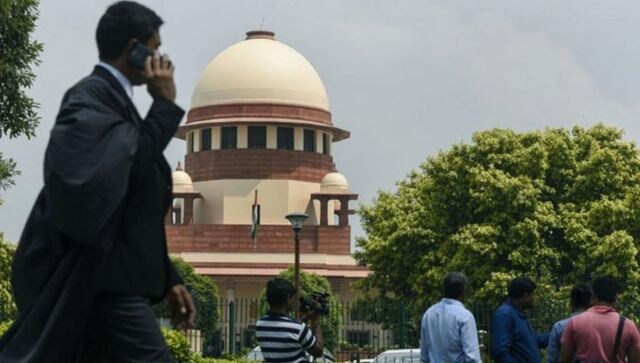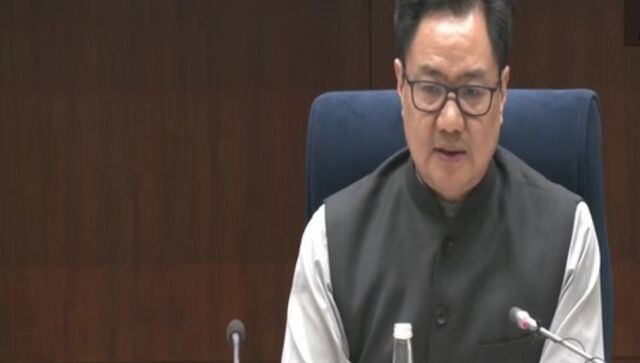Should Indian lawyers do away with robes? Dress code in the spotlight after law minister's remark
While some lawyers view the current dress code as ‘distinctive of their trade’, others call it a ‘colonial relic’. Then there’s a debate on amendments to the uniform in the summer months. Now, Law Minister Kirren Rijiju has shared his views

There is a debate on whether there should be changes in the dress code of lawyers in Indian courts. PTI (Representational Image)
Black gowns, white shirts or sarees and neck-bands– that is the first picture that pops up in our minds when we imagine lawyers in Indian courts.
Even though this dress code has been followed for many years, lately there has been a debate on whether it should be altered as per India’s weather conditions.
Commenting on the matter, Union law minister Kiren Rijiju said it would be better to consider a uniform that is suited to our weather.
Speaking at the Sabarmati Samwad program in Gujarat’s Ahmedabad organised by weekly magazine Panchajanya (published by the Rashtriya Swayamsevak Sangh), Rijiju was quoted as saying by Live Law, “Regarding the dress code in the courts, I won’t make any comment. It would be better to think about a dress code which is suited to our weather conditions. I will be speaking to the CJI (Chief Justice of India) as to whether we would continue wearing ‘English’ dress or should we adopt a dress code which is according to our weather conditions”.
“…or should we adopt a dress code which is according to our weather conditions.” : @KirenRijiju
— Live Law (@LiveLawIndia) October 18, 2022
What is the debate about the dress code in Indian courts? What is its history and have there been relaxations in the uniform? We explain.
Debate on dress code in courts
Paran Balakrishnan writes for Business Line that some lawyers view their uniform ‘distinctive of their trade’.
“The purpose of having a uniform is to signal equality before the law,” senior advocate Sanjoy Ghose told BQ Prime.
However, with rising temperatures in the past years, some have sought changes in the dress code.

Lawyers have to mandatorily wear black gowns and coats when in court. PTI (Representational Image)
Advocate Shailendra Mani Tripathi had moved the Supreme Court seeking exemption for lawyers from wearing the mandatory black coat in the top court and High Courts during the summer months.
On 25 July this year, the apex court dismissed his petition seeking changes in the rules by the Bar Council of India (BCI)– highest regulatory body of lawyers in the country.
Tripathi told Indian Express that besides the winter months in Delhi, it is difficult to wear coats rest of the year. He said he was looking for alternatives and “researching” on “what colours would be appropriate in the summer season”.
However, Tripathi clarified that he is not against wearing uniforms in courts. “No, uniforms are necessary. The uniform should be such that it makes our work easy and not create impediments instead. If we remain drenched in sweat, how will we work?” the advocate was quoted as saying by Indian Express.
Explaining the problems lawyers face in the summer season, he said, “In courts situated in rural areas, there are no fans, no electricity and lawyers get drenched in sweat even if they wear only a shirt. Coats can’t be worn in summers; uniforms should be in accordance with climatic conditions.”
In April this year, the BCI constituted a five-member committee to decide on the issue of dress code for lawyers.
This came after advocate Ashok Pandey of the Lucknow bench of the Allahabad High Court had filed a public interest litigation (PIL) in July 2021, saying the dress code of lawyers was “unreasonable” and violated their fundamental rights, reports Hindustan Times (HT).
“The petitioner has stated that the band is a symbol of Christianity and should be discontinued. As per his statement, non-Christians cannot be compelled to wear it. He has questioned the wearing of the coat and gown too,” Srimanto Sen, BCI secretary, said in his affidavit, as per HT.
He said the issue needs to be discussed with all the stakeholders.
“The issue requires detailed deliberations with all stakeholders, including senior members of the Bar and the judiciary, before the issue can be decided,” the BCI secretary added.
What is the current dress code?
As per Section 49 (1)(GG) of the Advocates Act, the dress code “will be in accordance with climatic conditions”. It also allows BCI to make rules in this regard, as per Indian Express.
Male lawyers in India are required to wear: black buttoned up coat, chapkan, achkan, black sherwani and white bands with gown; or a black open breast coat, white collar, and white bands with gowns.
This can be accompanied with long trousers (white, black striped or grey) or dhoti, while jeans are barred.
For female advocates: black and full or half-sleeved jacket or blouse, white collar with white bands with gown and sarees or long skirts (white, or black or any mellow or subdued colour without any print or design) or flare (white, black or black striped or grey).
Brief history of uniform
India has adopted its dress code for lawyers from the British who ruled the Indian subcontinent from 1858 till India and Pakistan gained Independence in 1947.
Wearing uniforms in courts dates back centuries.
Judges started wearing wigs in England circa 1650, while gowns were being worn even before that.
After Independence, India dropped wigs from its uniform but has continued with black robes and gowns.
The Advocates Act of 1961 makes it mandatory for Indian lawyers to wear black robe or coat with a white neckband.
Gowns are optional barring when appearing before the Supreme Court and High Courts.
When relaxations were made in dress codes
During outbreak of COVID-19 pandemic in 2020, the Supreme Court had relaxed its dress requirements, doing away with black coats and gowns for lawyers.

In the past, relaxations have been made for the lawyers in summer months. PTI (Representational Image)
Before the pandemic, with the onset of summer months, the Delhi High Court would suspend the requirement of a gown. Similar relaxation have been allowed by the Kerala and the Karnataka High Courts, reports BQ Prime.
“The current dress code is a colonial relic which has continued in our courts,” senior advocate Chander Uday Singh told BQ Prime.
“Perhaps, the time has come to move to more streamlined court clothing,” he added.
With inputs from agencies
Read all the Latest News, Trending News, Cricket News, Bollywood News,
India News and Entertainment News here. Follow us on Facebook, Twitter and Instagram.
also read

'Not transparent, internal politics in Judiciary...' Law Minister Rijiju on judicial appointments
Rijiju said India has a vibrant democracy and sometimes appeasement politics can also be observed

Indians not happy with collegium system, appointing judges is government's job, says Kiren Rijiju
The Law minister's remarks came after he had said at a conference in Udaipur last month that there is a need to rethink the collegium system of appointments to the higher judiciary
